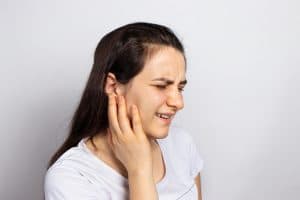 Just as snoring is not necessarily indicative of a bigger concern to many, teeth grinding can be often overlooked as an important problem. In other words, many individuals view concerns such as decay or infection caused by oral bacteria to be the biggest threat to their grins, but for others, that threat shows itself in the form of chronic bruxism. In today’s blog, your Houston, TX dentist will address the importance in seeking professional help for teeth grinding, and the negative effects that arise if you do not.
Just as snoring is not necessarily indicative of a bigger concern to many, teeth grinding can be often overlooked as an important problem. In other words, many individuals view concerns such as decay or infection caused by oral bacteria to be the biggest threat to their grins, but for others, that threat shows itself in the form of chronic bruxism. In today’s blog, your Houston, TX dentist will address the importance in seeking professional help for teeth grinding, and the negative effects that arise if you do not.
It’s More Than Just A One-Time Thing
In many cases, we often hear individuals expressing that they did not seek help sooner because they did not expect their grinding to be a big deal. Too often, bruxism can be written off as a one-time occurrence caused by either sleeping in an incorrect position or from talking in one’s seep. But what is really going on when this occurs? Chronic teeth grinding, also known as bruxism, is a condition in which an individual clenches and rubs their teeth together as the jaw moves from side-to-side, typically while unconscious. It can be caused from a variety of circumstances, such as the body’s attempt to regulate airflow or even from stress. If treatment is not sought in a timely manner, you will begin to experience significant damage to your smile in the form of worn structures that increase the probability that you will develop an infection or decay, as well as moderate to severe pain, difficulties eating or chewing, and more. If you suspect you grind your teeth at night, make sure to reach out to our team and learn your options immediately.
Damage Can Become Significant
One of the biggest concerns that arises from frequent bruxism is not necessarily the breakdown of your natural teeth, but the development of a painful jaw dysfunction known as TMJ disorder. Your temporomandibular joints (TMJ’s) are the two points at which your lower jaw hinges and thus connects it to your cranium. When your oral structures grind, you increase the chances of your lower mandible popping out of those joints and becoming misaligned. This not only causes difficulties opening the mouth, but pain as well as a popping and clicking sensation as your bite attempts to correct the problem.
How Guided Treatment Restores Your Function
While significant damage can be incurred from TMJ disorder, our team can utilize custom dental appliances to help. Splint therapy can be used to help comfortably and carefully guide your jaw back into place and ensure healthy healing, while custom mouthguards can protect your structures from future damage. For more information, contact our team today.
Learn More Today
To learn more about the ways our custom appliances can correct your jaw dysfunction and ease your chronic bruxism, contact Houston SleepWell in Houston, TX by calling 713-796-9600 today.










Recent Comments